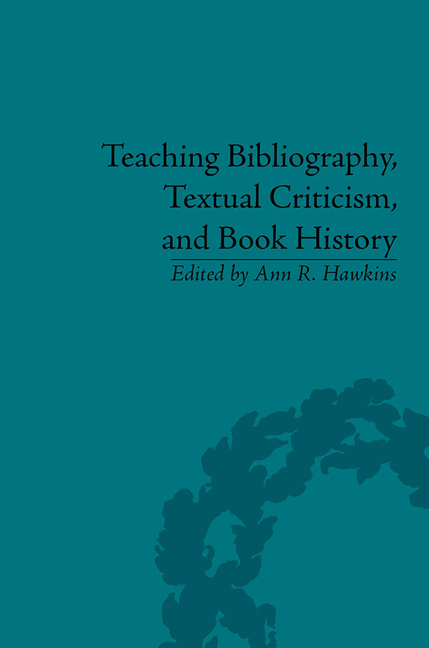Book contents
- Frontmatter
- Contents
- Notes on Contributors
- Foreword
- Introduction: Towards a pedagogy of Bibliography
- Part I Rationales
- Part II Creating and Using Resources
- Part III Methodologies
- Teaching ‘History of the Book’
- Preparing library school graduate students for Rare Book and Special Collections jobs: Assignments and Exercised that Work
- Book History and Library Education in the Twenty-first Century
- Making the Medicine Go Down: Baggy Monsters and Book History
- ‘They are Not Just Big, Dusty Novels’: Teaching Hard Times within the Context of Household Words
- ‘In a Bibleistic Way’: Teaching Nineteenth-Century American Poetry Through Book and Periodical Studies
- Teaching Bibliography and Research Methods
- Teaching Textual Criticism
- Part V Resources
- Index
Book History and Library Education in the Twenty-first Century
from Teaching ‘History of the Book’
- Frontmatter
- Contents
- Notes on Contributors
- Foreword
- Introduction: Towards a pedagogy of Bibliography
- Part I Rationales
- Part II Creating and Using Resources
- Part III Methodologies
- Teaching ‘History of the Book’
- Preparing library school graduate students for Rare Book and Special Collections jobs: Assignments and Exercised that Work
- Book History and Library Education in the Twenty-first Century
- Making the Medicine Go Down: Baggy Monsters and Book History
- ‘They are Not Just Big, Dusty Novels’: Teaching Hard Times within the Context of Household Words
- ‘In a Bibleistic Way’: Teaching Nineteenth-Century American Poetry Through Book and Periodical Studies
- Teaching Bibliography and Research Methods
- Teaching Textual Criticism
- Part V Resources
- Index
Summary
What relevance does book history have for those just beginning their library careers at the start of the twenty-first century? Despite the explosion in electronic resources, reports of the death of the book are still greatly exaggerated, and the book remains an important medium in the community at large, as well as within the library. Today's Masters in Library Science (MLS) students will inherit the existing book and other ‘analog’ collections which their predecessors have been building for hundreds of years, and they will be responsible for the fate of all the millions of physical print objects in their care. As they have in many other transition periods in book history – from the scroll to the codex, for instance, or from manuscript to print – librarians will have to decide which materials to preserve in their original format, which to transfer to new media, and which to leave behind. In short, they will make key decisions about the future of significant quantities of humanity's recorded legacy.
Likewise, they will face the even thornier issue of deciding what new print collections their libraries will build in this increasingly digital era. What will be the value of print compared to electronic resources? Does the printed codex book (and the printed journal, for that matter) still have a role for researchers? For what purposes? if the new role of libraries is to provide access to information that resides elsewhere and which is no longer under local custodial control, who will ensure that information is available to future generations?
- Type
- Chapter
- Information
- Publisher: Pickering & ChattoFirst published in: 2014



